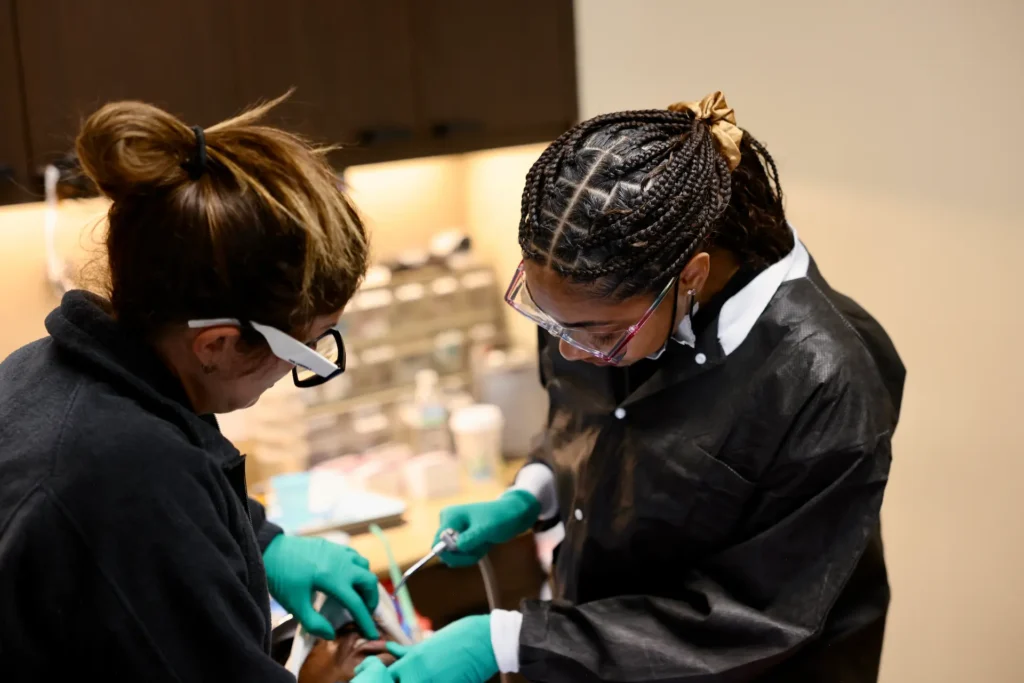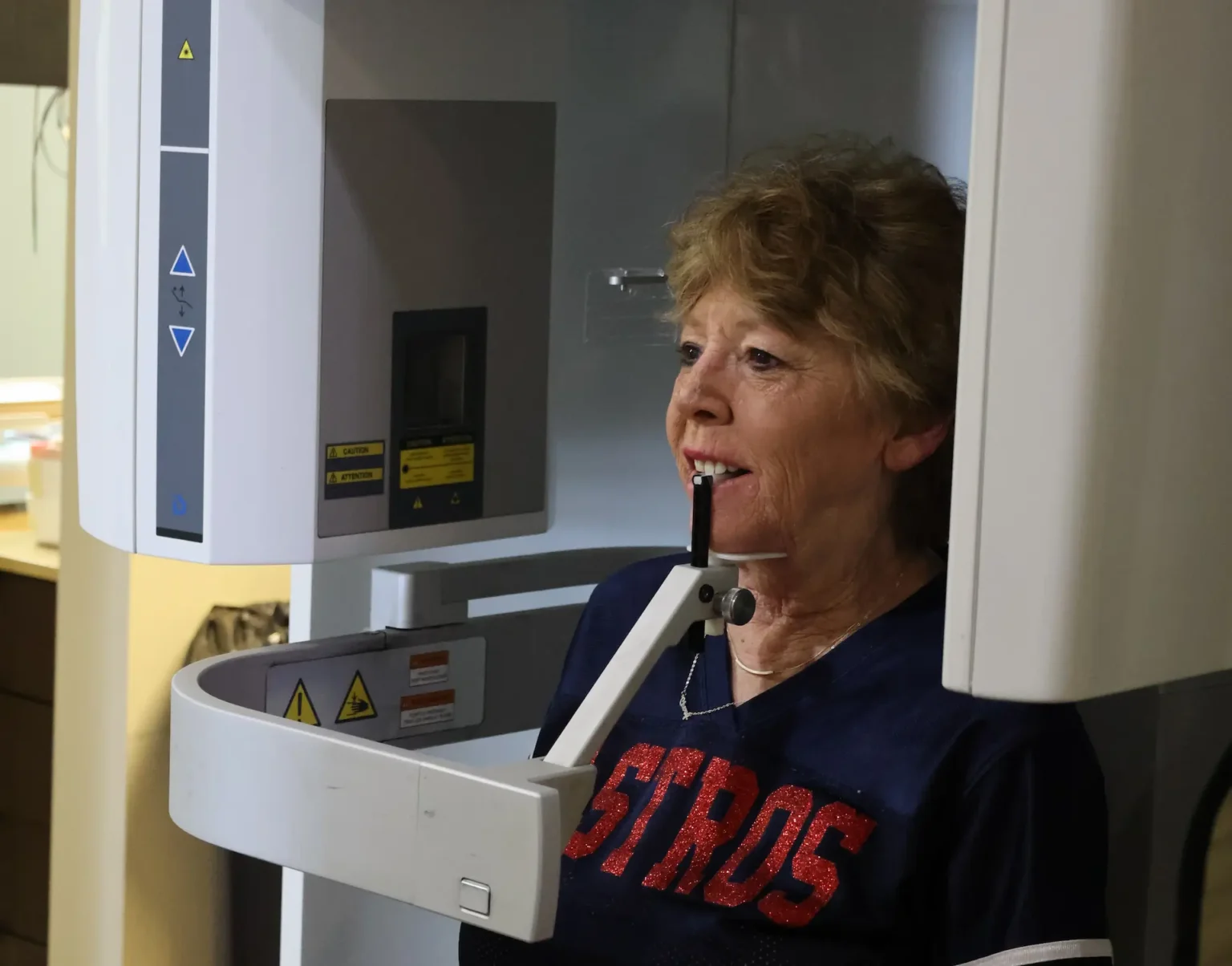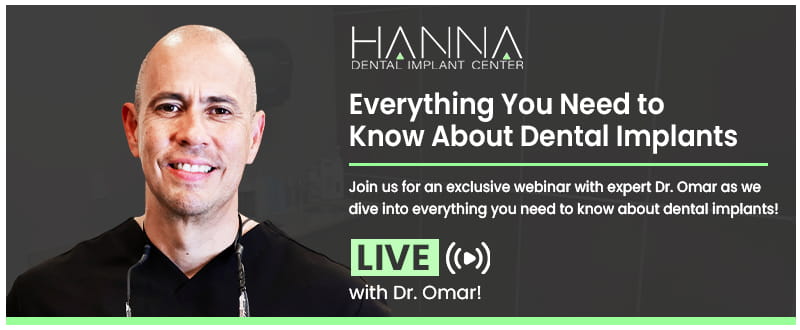Tooth loss is common in older adults and can make everyday things like eating, speaking, and smiling more difficult. According to the CDC, 1 in 7 adults over age 65 have lost all of their teeth. Many people turn to dentures, while others explore a more permanent option: dental implants.
So is it worth getting dental implants at 70 years old? Yes! Dental implants are a strong, long-term solution that look and feel like natural teeth. They help improve chewing, speech, and confidence without affecting nearby teeth.
Dr Hanna, our experienced dental implant specialist and his team have helped many seniors in their 70s restore their smiles with dental implants. If your health is stable and your gums are healthy, age is not a barrier. Even if you’ve been told implants are not for you, we will listen to you, examine your oral health and provide you with a long-term solution for missing teeth.
Key Takeaways
- Yes, you can get dental implants at any age. Age is not a barrier if you’re in good overall health.
- Dental implants for seniors are safe, effective, and long-term with proper care.
- Success rates in elderly patients are comparable to younger adults.
- Implants help improve chewing, speech, and self-confidence.
- Hanna Dental Implant Center specializes in personalized implant care for seniors, even those who have been turned away elsewhere.
Are Dental Implants Safe for Seniors?
A common concern among older adults is whether there’s an age limit for dental implants. The truth is, there isn’t. Being above a certain age doesn’t rule you out as a candidate.
Many seniors are surprised to learn that dental implants have high success rates in older adults. In fact, research shows success rates for implants in seniors are comparable to those in younger patients, especially when placed by a skilled specialist.
At Hanna Dental Implant Center, we take a personalized approach to care. Even if you’ve been told you’re not a candidate somewhere else, we encourage you to come in for a full evaluation. Dr. Raouf Hanna, a double-board certified periodontist, has years of experience treating complex cases and helping seniors achieve great results.
Before starting treatment, we’ll assess your medical history, bone health, and oral condition to make sure implants are the right fit for you. Your safety, comfort, and long-term success come first.
How Dental Implants Improve Quality of Life for Seniors
Dental implants can make daily life easier and more enjoyable, especially for older adults. Here are some of the benefits of dental implants for seniors:
Eat More Comfortably and Enjoy a Healthier Diet
Loose or missing teeth can make it hard to chew certain foods, leading to a limited diet. Dental implants feel secure and allow you to eat a wide variety of foods, including fruits, vegetables, and proteins that support overall health.
Speak Clearly and Smile Confidently
Gaps in your smile or loose-fitting dentures can affect your speech and make social situations uncomfortable. Implants stay firmly in place, helping you speak naturally and smile without worry.
Long-Term Comfort and a Natural Feel
Implants are designed to act like real teeth. They don’t move around or need to be removed at night. Most patients say they forget they even have them after a while because they feel so natural.
Help Protect Your Jawbone
When a tooth is lost, the bone underneath can start to shrink over time. Implants help keep the jawbone strong by providing the stimulation it needs, which helps maintain your facial structure and overall oral health.
Common Concerns About Getting Dental Implants in Your 70s
It’s normal to have questions or worries before considering dental implants, especially later in life. Here are answers to the most common concerns we hear from senior patients.
Is 72 too old for dental implants?
No, it’s not. Many people in their 70s and even 80s successfully receive dental implants.
What if I have health conditions or take medications?
Conditions like diabetes or high blood pressure don’t automatically disqualify you. At Hanna Dental Implant Center, we work closely with your physician to make sure any medical issues are under control before starting treatment. We also review your medications to avoid any complications.
What does recovery look like at my age?
Recovery is usually smoother than most patients expect. Minor swelling or discomfort is common for a few days, but with proper care, healing progresses well. Most patients return to their normal routine within a week.
What if I don’t have enough bone?
Age-related bone loss is common, but we have options. Bone grafting and advanced techniques like zygomatic implants are available for patients with low bone density. We evaluate your jaw thoroughly and offer solutions tailored to your needs.
Will it be painful?
No. During the procedure, local anesthesia or sedation ensures you feel no pain. Afterward, any soreness is usually mild and manageable with medication. We make your comfort a top priority before, during, and after treatment.
Tooth Replacement Options for Seniors: How Implants Compare

When it comes to replacing missing teeth, seniors have several choices. Each has its benefits, but dental implants are often preferred for their comfort, stability, and long-term results.
Implants vs. Dentures
Dentures can help restore function and appearance, but they may slip or cause discomfort over time. Implants, on the other hand, are fixed in place. They allow you to eat, speak, and smile without worrying about movement or adhesives. For some patients, implant-supported dentures offer a stable middle ground between the two options.
Implants vs. Bridges
Bridges rely on support from the surrounding teeth, which may require filing down healthy enamel. Dental implants rely on an implant post, which helps preserve the jawbone. This makes them a more independent and long-lasting solution, especially when only one or two teeth need to be replaced.
Implants vs. Root Canals (When Teeth Are Severely Damaged)
Root canals can save a natural tooth if it’s still healthy enough to support a crown. But in cases where the tooth is badly damaged or already missing, dental implants are often a better long-term solution. They don’t decay and can last for decades with proper care.
What to Expect: The Dental Implant Process at Hanna Dental for Seniors
At Hanna Dental Implant Center, the dental implant process is carefully designed with your comfort, safety, and long-term success in mind. Here’s what to expect when you walk into our clinic:
Personal Consultation and Full Evaluation
We begin with a thorough evaluation of your oral and overall health. Dr. Raouf Hanna, a double-board certified periodontist, will assess your medical history, bone structure, and dental goals to determine the best approach for you.
Customized Treatment Plan
Based on your needs, we create a detailed plan that outlines the type of implant, number of teeth to replace, and any additional procedures that may be required such as bone grafting. If you qualify, we may recommend same-day dental implants, which allow for implant placement and restoration in one visit.
Implant Placement and Restoration
During the procedure, dental implants are placed into the jawbone with precision and care. For many patients, the final restoration (your permanent crown, bridge, or denture) can also be placed on the same day.
In some cases, based on your health or specific oral conditions, the specialist may advise waiting until the implant fully heals before completing the final step. For these cases, patients will be fitted with a temporary restoration to ensure they can eat, speak, and smile with confidence while waiting for their final restoration.
Healing and Integration
If a delayed restoration is needed, we allow time for the implant to fully bond with your jawbone through a natural process called osseointegration. A temporary restoration that looks and feels like a natural tooth will be provided in the meantime to maintain appearance, function, and confidence.
Long-Term Follow-Up and Care
After your procedure, we stay involved with regular follow-up visits and guidance to help you keep your implants healthy and lasting for years to come.
Whether you need one tooth replaced or a full smile restoration, our experienced team is here to make the process smooth, personalized, and comfortable every step of the way.
Schedule Your Consultation Today!
Getting dental implants at 70 can be life-changing. With the right care, you can enjoy a stronger bite, a more confident smile, and better long-term oral health.
At Hanna Dental Implant Center, we specialize in helping seniors make informed decisions about their tooth replacement options. Our team is here to guide you through every step, from your first consultation to your final restoration.
If you’re ready to explore what dental implants can do for you or a loved one, book a consultation with us now to get started!
Frequently Asked Questions
Is 72 too old for dental implants?
No, 72 is not too old. Many seniors in their 70s and even 80s receive dental implants successfully. What matters most is your overall health, bone quality, and any medical conditions being well managed.
Is dental implant advisable for seniors?
Yes. Dental implants are often a great option for seniors because they provide stability, preserve jawbone health, and improve overall quality of life. At Hanna Dental Implant Center, we evaluate each patient carefully to ensure it’s the right choice.
What is the best tooth replacement for seniors?
The best option depends on your needs, but dental implants are often preferred for their long-term benefits. They stay fixed in place, feel natural, and help protect your jawbone, unlike removable dentures or traditional bridges.
What is the age limit for dental implants?
There is no official age limit. Seniors of all ages can qualify for dental implants.
What is the oldest age to get dental implants?
There is no set upper age limit. Patients in their late 80s and even 90s have received implants with great results. Age alone is not a reason to rule them out.



